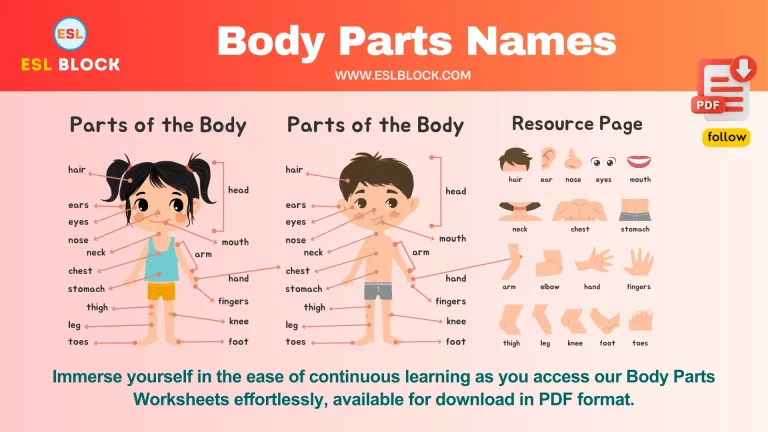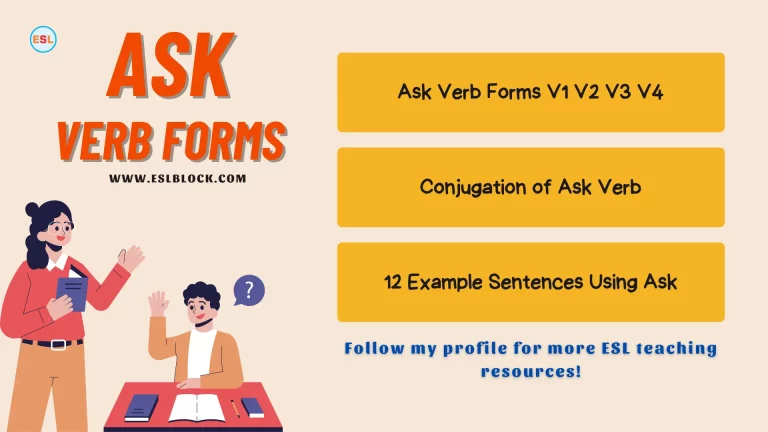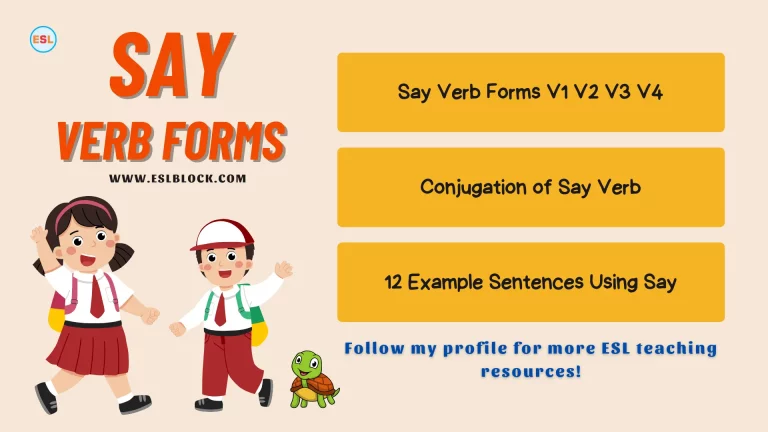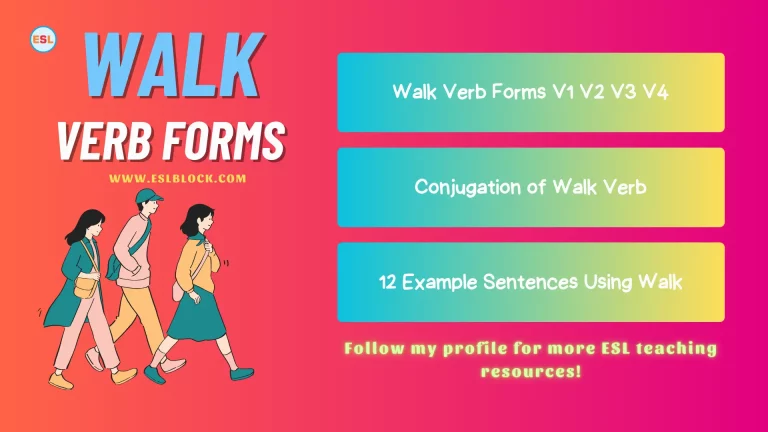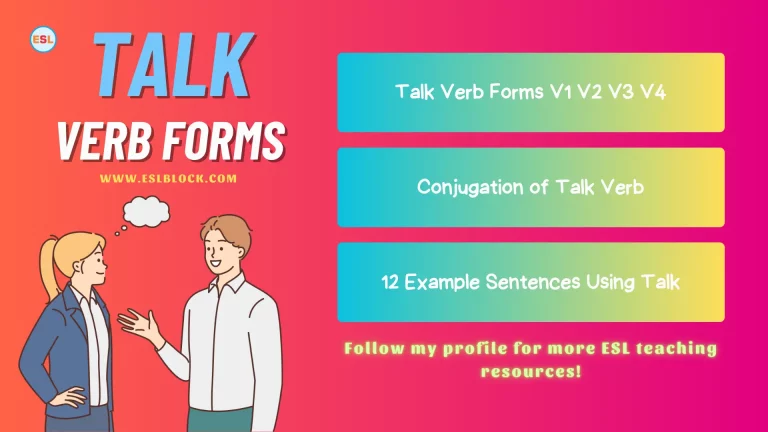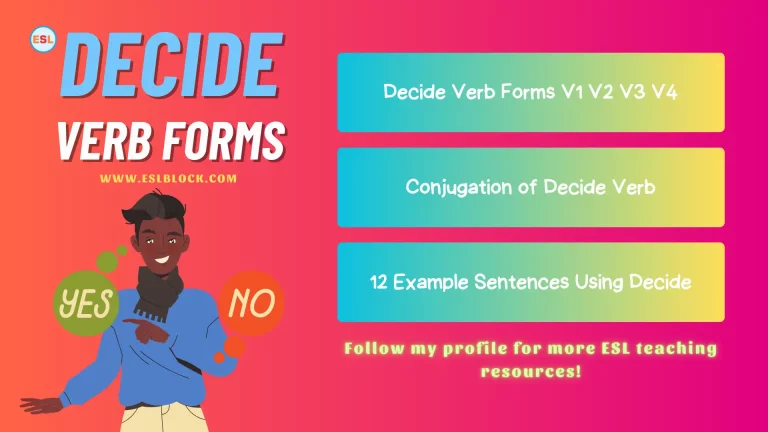What is an Interjection of Parts of Speech in English Grammar?
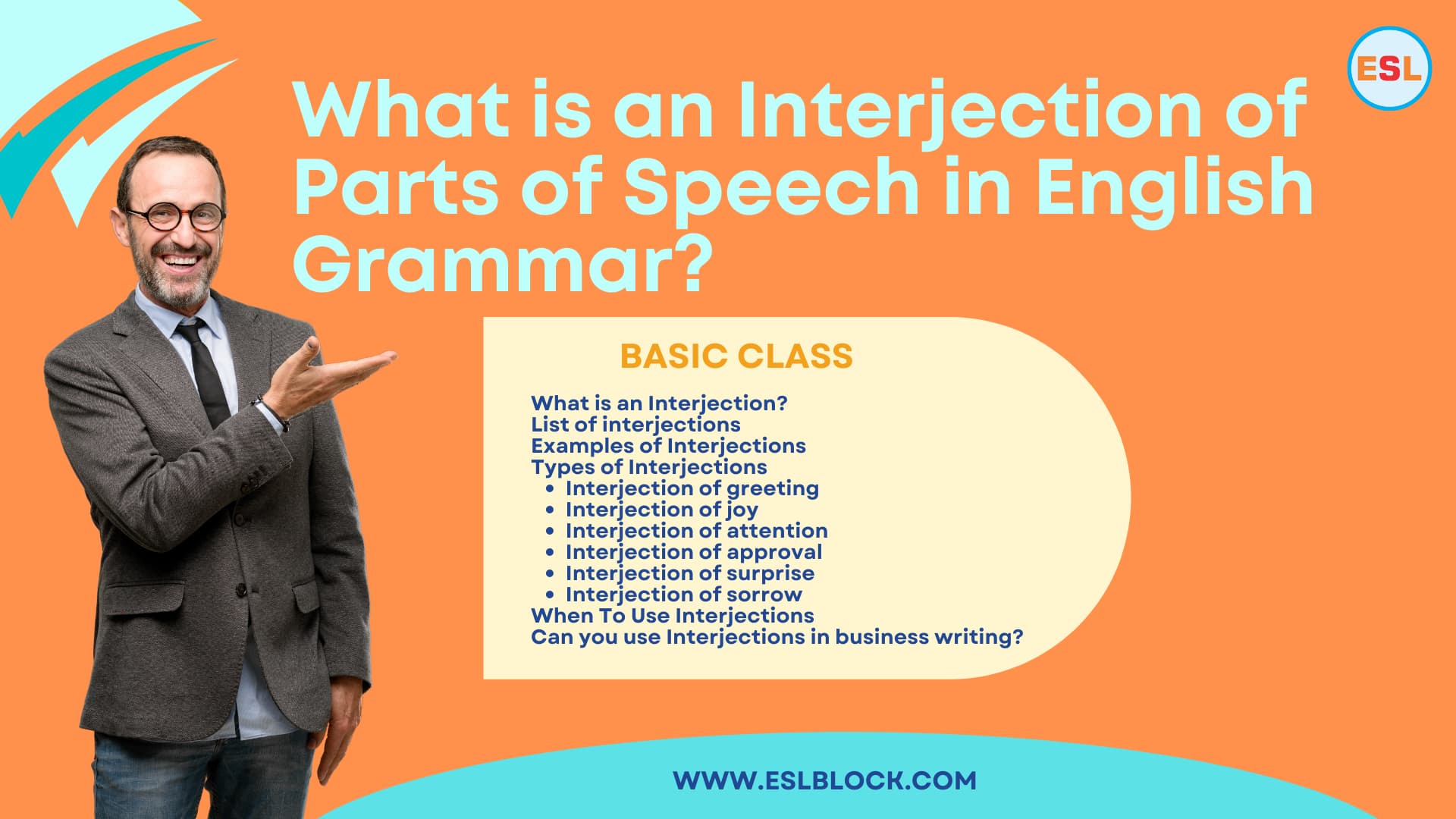
What is an interjection? If you’re oriented with English spoken language or the general language, you’ve probably heard of interjections. Interjections are words that can be spoken or written and may have many usages based on the intentions of the involved people. What are interjections? How do you use them in English writing? This article will discuss the meaning of interjections, the appropriate times to use them, and how they compare to emoticons.
As a guide, the below definitions and tables provide the fundamental use of the Interjection. Read on to get a more in-depth explanation of the rules and examples of when and how to use Interjections.
Learn to use Interjection with example sentences and ESLBLOCK worksheets for printing.
Also read: Baby Farm Animals
What is an Interjection?
Interjections are words that communicate a powerful emotion through a single phrase or two. They are among the nine parts of speech; interjections are used in sentences to establish the tone and convey emotion. Although they don’t connect grammatically to other parts of the sentence, they reflect how the author or speaker is feeling.
Interjunction is a radically different part of speech from a verb, noun, pronoun, adjective, and the rest. They don’t help you understand relationships between words, nor do they have much of a grammatical definition. Curious to learn more about this exciting group of words? This article answers the queries, “what is an interjection, and why are they so superior?”
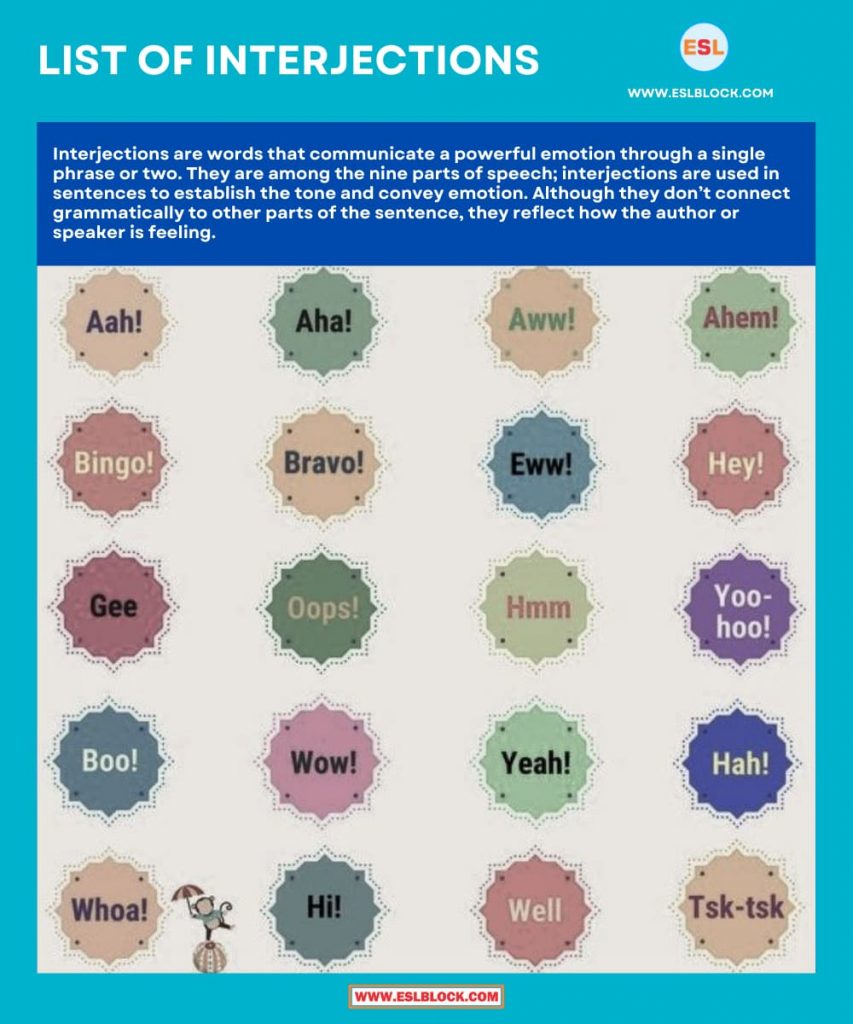
List of interjections
The following list shows some examples of interjections;
- Hey!
- Hi!
- Huh!
- Meh!
- Oh!
- Ow!
- Phew!
- Ugh!
- Uh-oh!
- Whoops!
- Wow!
- Yikes!
- Yuck!
Examples of Interjections
Here are some example sentences using Interjunction!
- Hey! Get off that floor!
- Oops! I dropped my pen!
- Wow! They just won a million dollars! Congratulations!
- Oh, that is a surprise.
- No! I’m not ready to go yet! Please!
- Good! Now we can move on.
- Well, this was not best food. Sorry!
- Oops! I did it again!
- Ooh, what a lovely cat!
- Yahoo, we did it!
- Shh, I can’t hear what she’s saying.
- They’ve done it! Hurrah!
- Bravo, Charlotte! You’re right.
- Teacher said we have to, ugh, clean our classroom!
- Well, so Oliver got the job?
- Oh, how wonderful!
- Whoops, I dropped the purse!
- Yikes, look at the size of that shoes!
- Meh, there’s nothing great about it.
- A seven-layer wedding party? Ooh-la-la!
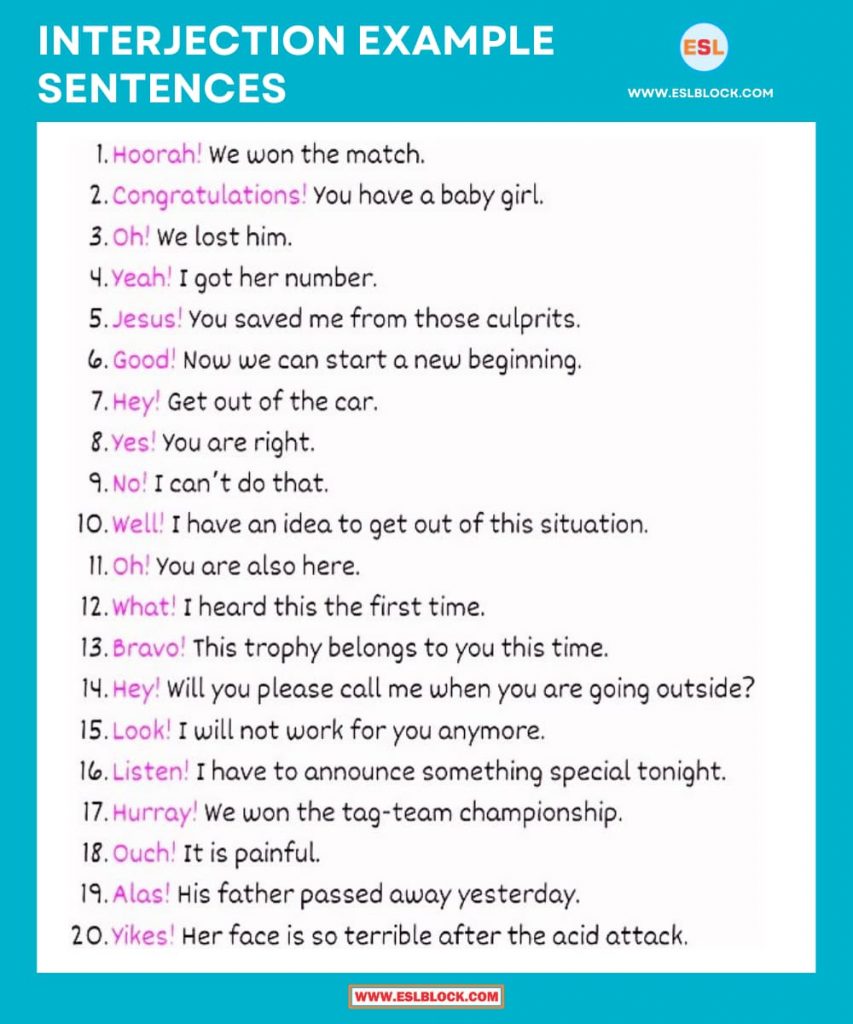
Types of Interjections
There are six main types of Interjunction.
- Interjection of greeting
- Interjection of joy
- Interjection of attention
- Interjection of approval
- Interjection of surprise
- Interjection of sorrow
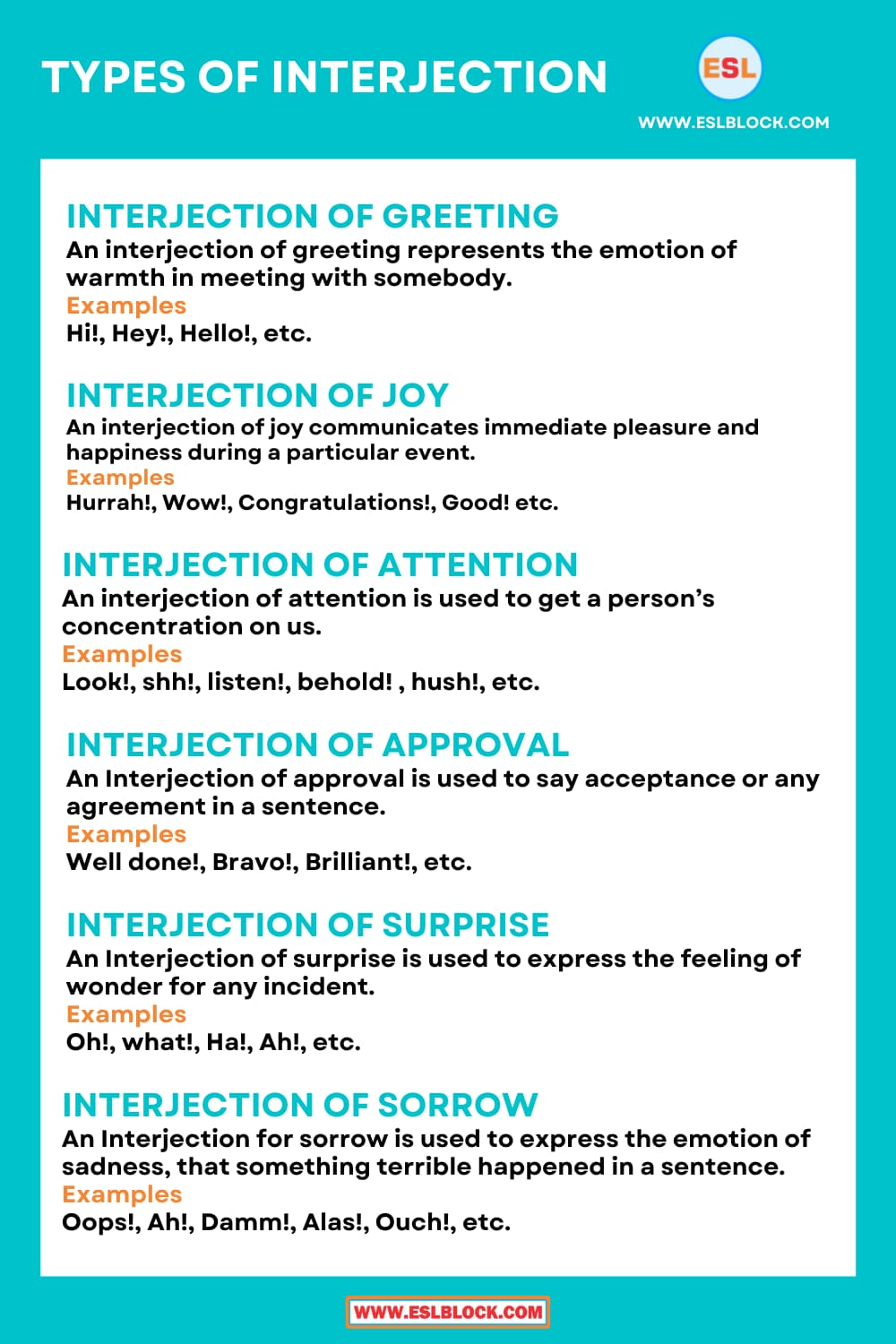
Interjection of greeting
An interjection of greeting represents the emotion of warmth in meeting with somebody.
- Hi!, Hey!, Hello!, etc.
Examples
- Hey! What were you doing yesterday?
- Hi! How are you?
- Hello! I’m William, your new teacher.
Interjection of Joy
An interjection of joy communicates immediate pleasure and happiness during a particular event.
- Hurrah!, Wow!, Congratulations!, Good! etc.
Examples
- Good! Now they are going to the next game.
- Wow! You look so handsome!
- Congratulations! I wish you a happy married life!
- Hurrah! They won the match!
Interjection of Attention
An interjection of attention is used to get a person’s concentration on us.
- Look!, shh!, listen!, behold! , hush!, etc.
Examples
- Look! I’m so tired today.
- Behold! I saw something there.
- Shh! keep the mouth shut.
- Yoo-hoo! Is anyone here?
- Hush, Robin!, warned Julia.
Interjection of Approval
An Interjection of approval is used to say acceptance or any agreement in a sentence.
- Well done!, Bravo!, Brilliant!, etc.
Examples
- Well done! You have ended the task successfully.
- Bravo! You spelled it perfectly.
- Brilliant! Sophia is a student at our college.
Interjection of surprise
An Interjection of surprise is used to express the feeling of wonder for any incident.
- Oh!, what!, Ha!, Ah!, etc.
Examples
- Ah! I got my first earnings.
- What! Are you serious?
- Oh! I met her yesterday.
- Ha! What a pleasant surprise.
Interjection of sorrow
An Interjection for sorrow is used to express the emotion of sadness, that something terrible happened in a sentence.
- Oops!, Ah!, Damm!, Alas!, Ouch!, etc.
Examples
- Ouch! It’s damaging a lot.
- Alas! He got burst in his right hand.
- Oops! Sorry. It was my responsibility.
- Help! I’m in a big crisis.
When To Use Interjections
Interjections are an excellent way to add the conversation to life. The interjection could be anything from greetings to curses or exclamations. They can be used in independent phrases in response to a situation or comment, and they are excellent for making you sound like a native English speaker.
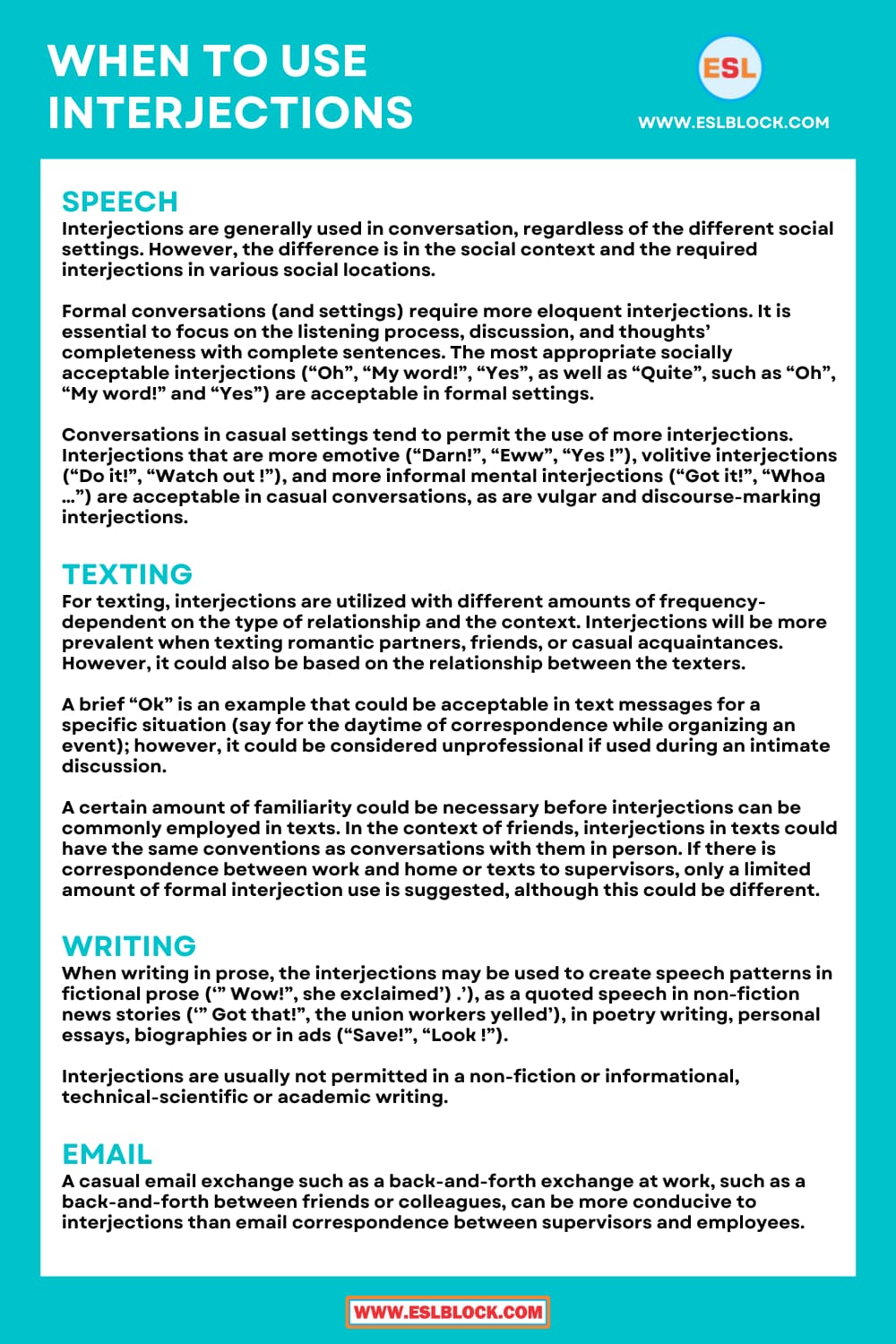
Speech
Interjections are generally used in conversation, regardless of the different social settings. However, the difference is in the social context and the required interjections in various social locations.
Formal conversations (and settings) require more eloquent interjections. It is essential to focus on the listening process, discussion, and thoughts’ completeness with complete sentences. The most appropriate socially acceptable interjections (“Oh”, “My word!”, “Yes”, as well as “Quite”, such as “Oh”, “My word!” and “Yes”) are acceptable in formal settings.
Conversations in casual settings tend to permit the use of more interjections. Interjections that are more emotive (“Darn!”, “Eww”, “Yes !”), volitive interjections (“Do it!”, “Watch out !”), and more informal mental interjections (“Got it!”, “Whoa …”) are acceptable in casual conversations, as are vulgar and discourse-marking interjections.
Texting
For texting, interjections are utilized with different amounts of frequency-dependent on the type of relationship and the context.
Interjections will be more prevalent when texting romantic partners, friends, or casual acquaintances. However, it could also be based on the relationship between the texters.
A brief “Ok” is an example that could be acceptable in text messages for a specific situation (say for the daytime of correspondence while organizing an event); however, it could be considered unprofessional if used during an intimate discussion.
A certain amount of familiarity could be necessary before interjections can be commonly employed in texts. In the context of friends, interjections in texts could have the same conventions as conversations with them in person.
If there is correspondence between work and home or texts to supervisors, only a limited amount of formal interjection use is suggested, although this could be different.
Writing
When writing in prose, the interjections may be used to create speech patterns in fictional prose (‘”Wow!”, she exclaimed’) .’), as a quoted speech in non-fiction news stories (‘”Got that!”, the union workers yelled’), in poetry writing, personal essays, biographies or in ads (“Save!”, “Look !”).
Interjections are usually not permitted in non-fiction or informational, technical-scientific, or academic writing.
A casual email exchange such as a back-and-forth exchange at work, such as a back-and-forth between friends or colleagues, can be more conducive to interjections than email correspondence between supervisors and employees.
Interjection Examples
In this article, we will examine a variety of interjections, and how to use these in our everyday conversations.
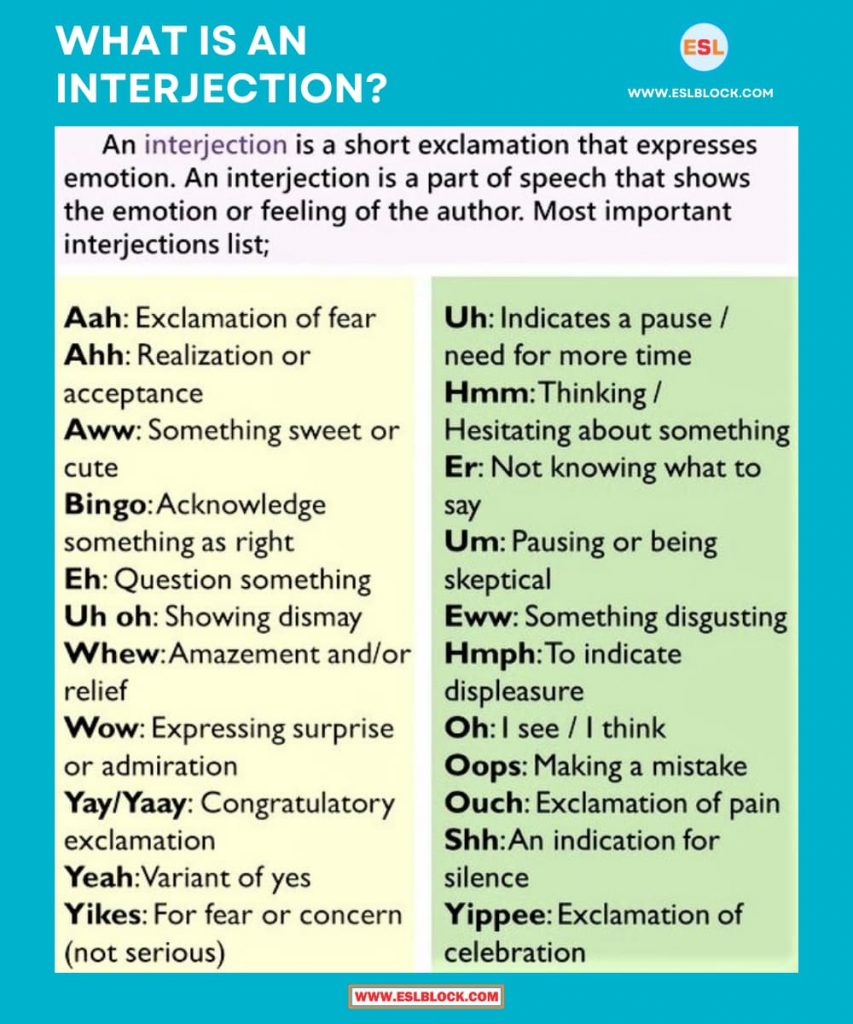
Aah
Aah meaning and Aah interjection examples:
- Aah, that’s awesome!
- Aah, now I see what your point is.
- Aah, I give up!
- Aah! It’s eating my hand!
Ah
Ah, meaning and Ah interjection examples:
- Ah, this drink is fine.
- Ah, now I understand.
- Ah! There you are!
- Ah! Well, I’ll have to come back tomorrow.
Aha
Aha! So you planned all this, did you?
Ahem
The voice of clearing one’s throat. They are used to getting someone’s attention, especially if they don’t know (or forgot) that you’re there.
Ahem! Can I propose?
Alas
Expressing grief or pity
Alas, my love, I must leave now.
Argh
Saying annoyance, anger, or frustration
Argh, get that cat off the table!
Aw, Aww
- Aw, come on, Andy!
- Aww! Just look at that puppy.
- Aww, that’s so sad; he hasn’t yet learned to ride a bike.
Bah
Expressing dismissive or annoyed
Bah, I never liked him anyway.
Behold
Expressing attention
Behold! The bride comes.
ALSO READ: Angles in a Triangle Worksheet
Can you use Interjections in business writing?
As a rule, it is best to avoid using interjections when writing for business, however, when used sparingly they can have a powerful effect and can add some excitement to the content. A lot of interjection-invoked peps but it could cause you to appear a bit sloppy.
Interjection InfoGraphics
Here are some printable infographics about Interjection. Printable infographics are a fantastic way to share a significant amount of details in a short time in a stunning way. The Interjection infographic can help teachers and students to share their thoughts easily.
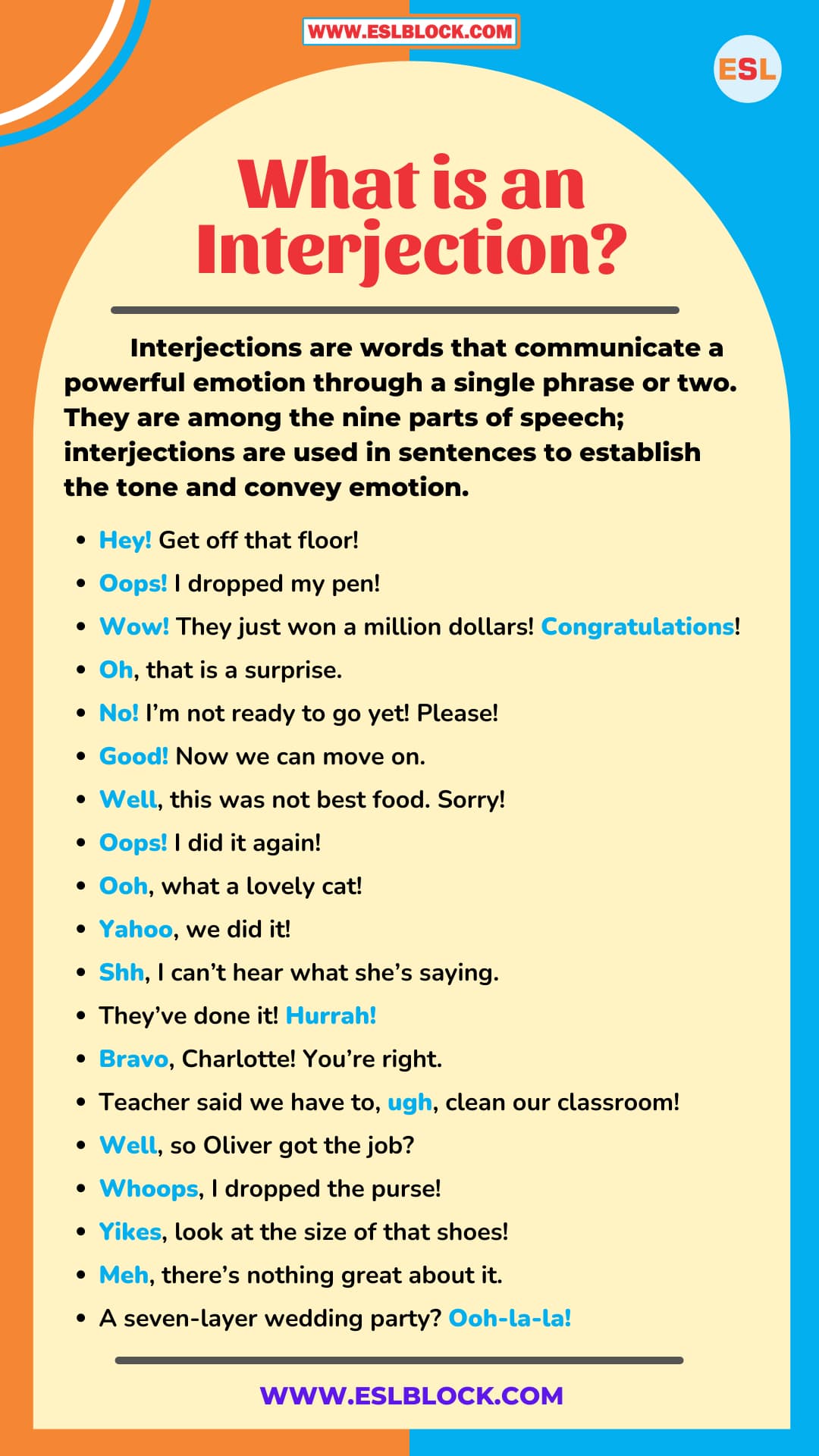
My Considerations
With this set of activities and explanations, you will quickly determine whether you are making the most effective use of the Interjection and how they could be used to enhance English writings.
Since the articles are the main part of English Grammar, the importance of developing English learning skills cannot be undervalued without Interjection.
You can read the above sample sentences about Interjection to improve your understanding of English grammar.
Encourage your children to learn these basic but commonly used Interjection, by following the simple example sentences given above. Then, save this list of Interjection sentences, handy for your kids in future.
If you enjoyed a printable infographic about What is an Interjection, I’d be very thankful if you’d help it spread by emailing it to your friends or sharing it on Pinterest, Reddit, Twitter, Instagram, or Facebook. Thank you!
Also read: Adjectives That Start With Y
Recap of what we just learned
- What is an Interjection?
- List of interjections
- Examples of Interjections
- Types of Interjections
- When To Use Interjections
- Examples of Using Interjections in Sentences
- Can you use Interjections in business writing?
- Interjection InfoGraphics
With ESLBLOCK, you will not face problems studying new ideas. If you are in doubt, the qualities of blog post about What is an Interjection, reach us through our blog’s comment section. Keep checking back! We’ll attempt to give you feedback as early as possible. Thank you!
Also read: Adjectives That Start With Z
Related Topics
Explore the full list of Adjectives to Describe a Person from A to Z!
- A Adjectives to Describe a Person
- B Adjectives to Describe a Person
- C Adjectives to Describe a Person
- D Adjectives to Describe a Person
- E Adjectives to Describe a Person
- F Adjectives to Describe a Person
- G Adjectives to Describe a Person
- H Adjectives to Describe a Person
- I Adjectives to Describe a Person
- J Adjectives to Describe a Person
- K Adjectives to Describe a Person
- L Adjectives to Describe a Person
- M Adjectives to Describe a Person
- N Adjectives to Describe a Person
- O Adjectives to Describe a Person
- P Adjectives to Describe a Person
- Q Adjectives to Describe a Person
- R Adjectives to Describe a Person
- S Adjectives to Describe a Person
- T Adjectives to Describe a Person
- U Adjectives to Describe a Person
- V Adjectives to Describe a Person
- W Adjectives to Describe a Person
- X Adjectives to Describe a Person
- Y Adjectives to Describe a Person
- Z Adjectives to Describe a Person

